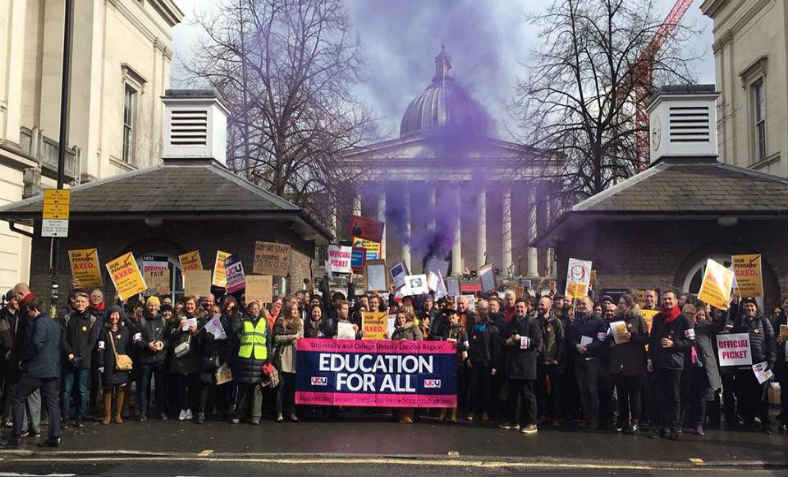 UCU picket and strike. Photo: @UCULondon
UCU picket and strike. Photo: @UCULondon
Solidarity among UCU strikers was not born on social media, but on the mass activity of the picket line, argues Milly Williamson
We are in the midst of an extraordinary change in consciousness among university staff who have been involved in the national UCU dispute to defend our pensions. Now is a good time to consider how it is that we strikers have become different people to the ones we were four weeks ago.
In some quarters, this new mood is a product of social media where, according to one report, a single hashtag, ‘No Capitulation’, ‘saved the strike’. There’s no question that social media has been an important organising tool in this strike. And ‘No Capitulation’ is definitely a powerful slogan that summed up the mood of anger perfectly when UCU officials agreed a disastrous deal with the employers. But that hashtag articulated the mood rather than created it. Social media has not been the engine that has powered our new found confidence, collectivity and rebelliousness – and it wasn’t the reason we forced a rejection of the deal. The solidarity we experience and the defiance we now feel after years of compliance and demoralisation, was born on huge mass picket lines of UCU members and student supporters up and down the country. Thousands of us changed on those picket lines (and in the mass action committees and branch meetings that organised them).
On the morning of the attempted sell out, 40 of the 63 striking union branches had held emergency branch meetings which were each attended by hundreds of strikers (Goldsmiths had about 120, Manchester over 400 – and these numbers were repeated up and down the country). Each of those branch meetings voted either overwhelmingly or unanimously to rejectt the deal. The anger in the rooms was palpable and the sense of defiance grew as we watched hundreds of our fellow strikers’ hands raised in votes to reject the deal.
Then branch officers carried that mood to UCU as they left branch meetings to attend a reps’ meeting at the union headquarters. About 100 defiant branch officers descended on that meeting with one message – reject the deal. Meanwhile, from those branch meetings, rank and file union members organised which members would go to the lobby outside UCU headquarters and who would go back to the picket lines. Then hundreds and hundreds assembled outside UCU head office in London and other cities. I attended the London lobby. To say that the mood at the lobby was angry is putting it mildly. One regional official told me that the sound of angry chanting and singing was heard throughout the building, and was electrifying to some and deeply worrying to those who sought to sell out the strike. There was no way the Higher Education Committee, who were voting on the deal later that day, could avoid the collective anger on the street nor in the reps’ meeting. By early afternoon, the deal was voted down.
Why is it so crucial to identify the importance of collective action over social media? At the huge national activist meeting held at Goldsmiths last Friday we once again came together collectively to plan the next steps in the dispute and also to discuss how to fight the wider issues of the marketization of education. As you can imagine, the mood was electric after our success in stopping the sell-out deal. I can’t count the number of people who said they were changed by this dispute and that the experience of picket lines, of talking to each other across usually separate departments, of having the space and togetherness on those picket lines to remember what education should be about and to support each other, was key.
This is important because we have to keep hold of this collectivity and defiance in the next stage of the dispute. Working to rule and the institutionally staggered strike days coming up are going to be tougher. Back inside our institutions managers will try to guilt trip or bully us into carrying out tasks outside of our contracts and will try to individualise us and pressurise us into doing things that break the action. We have to keep our confidence, defiance and resolve intact. And that won’t happen on Twitter, even if it can help us to communicate and to share experiences. We need to organise physical collective actions and hold regular meetings to stop people feeling isolated. At my place we have organised to leave the buildings together at the end of the day. We have “lunch outs” planned for the coming weeks where we all stop working and meet in the canteen to discuss tactics over sandwiches and ‘solidarit-tea’. We are holding branch meetings and national activist meetings to prepare for future action and to try to pre-empt any future attempts to sell us short. This work is already happening at many institutions and it needs deepening and extending. It’s no good watching it all on a WhatsApp list or Twitter thread. People have to stay active and meet collectively. We can win this dispute, and we should use every tool available to us. But collective action is the key to our success.

